-
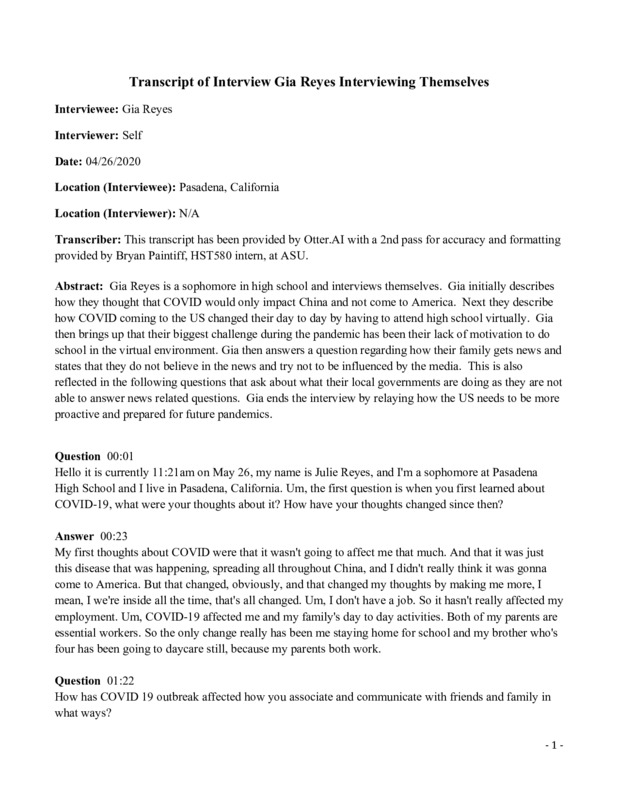
2020-05-26
C19OH
-
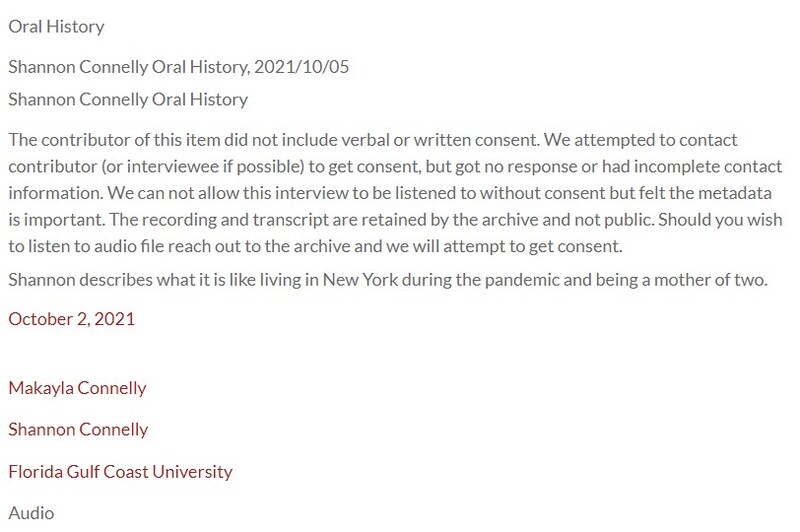
2021-10-02
The contributor of this item did not include verbal or written consent. We attempted to contact contributor (or interviewee if possible) to get consent, but got no response or had incomplete contact information. We can not allow this interview to be listened to without consent but felt the metadata is important. The recording and transcript are retained by the archive and not public. Should you wish to listen to audio file reach out to the archive and we will attempt to get consent.
-
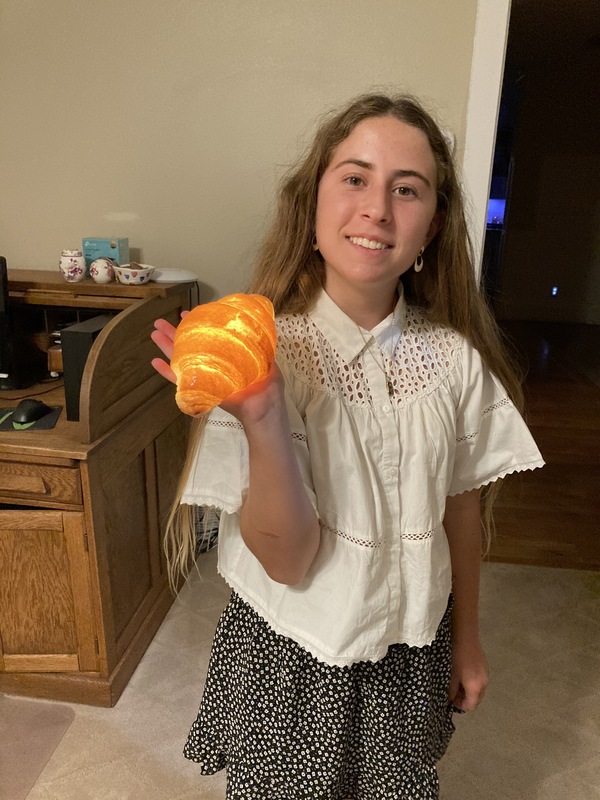
2021-10-05
As her parent, it was interesting to ask my daughter questions about the pandemic and hear her responses. As a family, we were really lucky to stay healthy and be able to spend a lot of extra time together.
I've transcribed the interview in the attached Word file.
-
2021-08-03
Homemade recipe of Carbonara for my son's tenth birthday, with all the restaurants closed, we improvised.
-
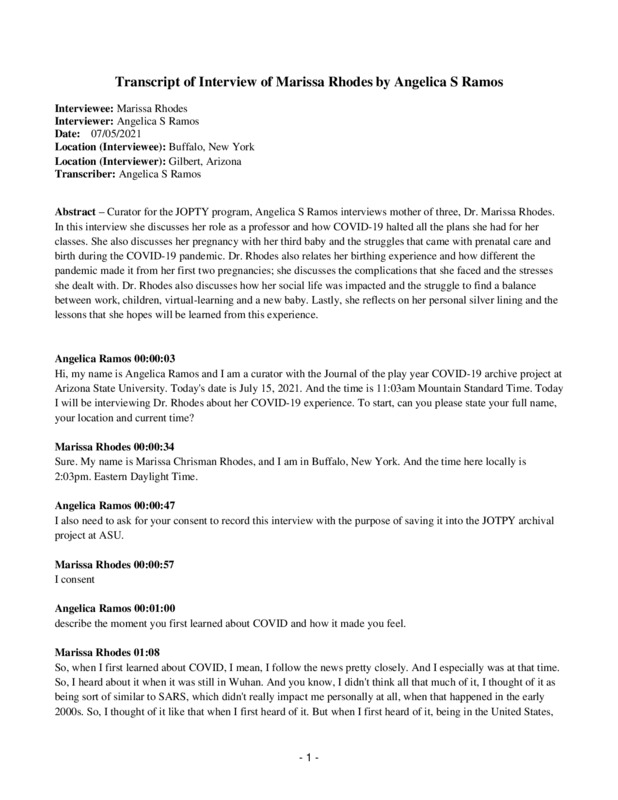
2021-07-15
Curator for the JOPTY program, Angelica S Ramos interviews mother of three, Dr. Marissa Rhodes. In this interview she discusses her role as a professor and how COVID-19 halted all the plans she had for her classes. She also discusses her pregnancy with her third baby and the struggles that came with prenatal care and birth during the COVID-19 pandemic. Dr. Rhodes also relates her birthing experience and how different the pandemic made it from her first two pregnancies; she discusses the complications that she faced and the stresses she dealt with. Dr. Rhodes also discusses how her social life was impacted and the struggle to find a balance between work, children, virtual-learning and a new baby. Lastly, she reflects on her personal silver lining and the lessons that she hopes will be learned from this experience.
-
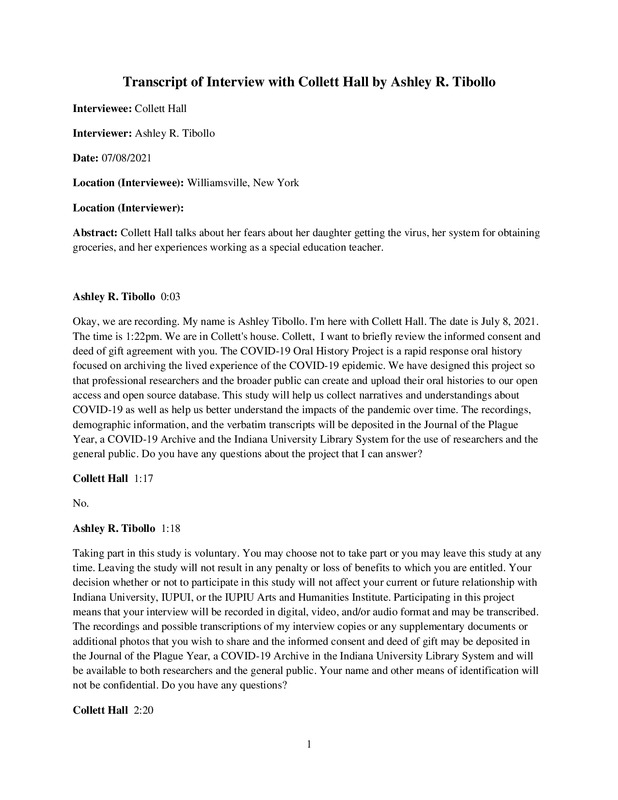
07/08/2021
Collett Hall talks about her fears about her daughter getting the virus, her system for obtaining groceries, and her experiences working as a special education teacher.
-
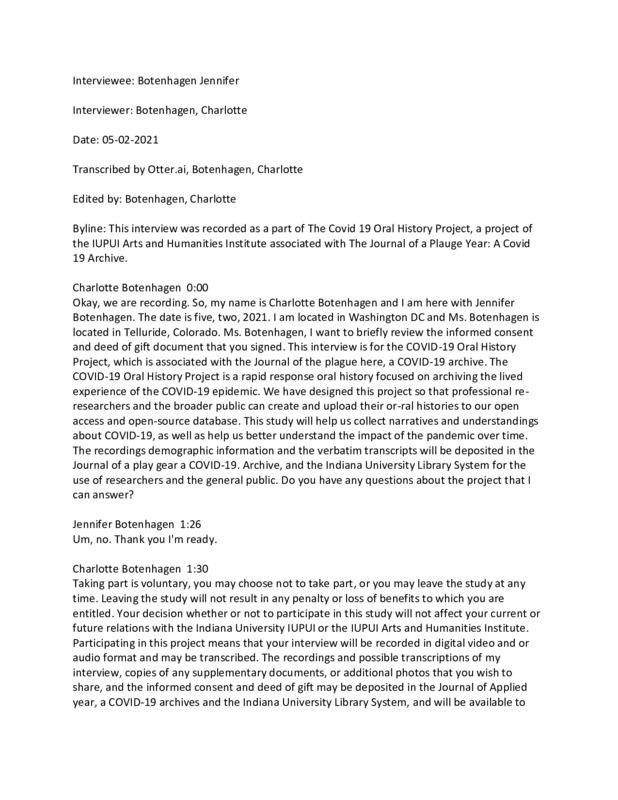
2021-05-02
This was an interview from Jennifer Botenhagen who is a preschool teacher living in a tiny mountain town. This interview details her experience adapting to teaching during the COVID-19 pandemic.
-
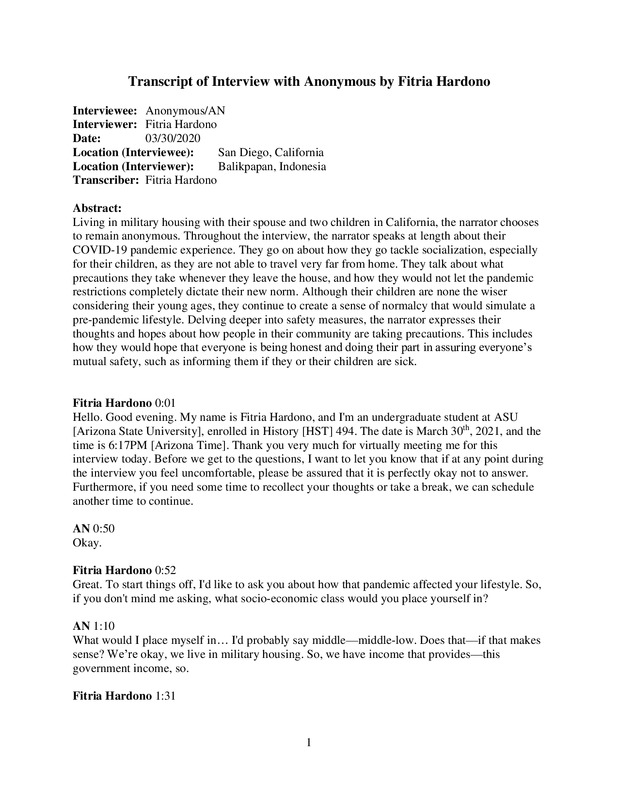
03/30/2021
Living in military housing with their spouse and two children in California, the narrator chooses to remain anonymous. Throughout the interview, the narrator speaks at length about their COVID-19 pandemic experience. They go on about how they go tackle socialization, especially for their children, as they are not able to travel very far from home. They talk about what precautions they take whenever they leave the house, and how they would not let the pandemic restrictions completely dictate their new norm. Although their children are none the wiser considering their young ages, they continue to create a sense of normalcy that would simulate a pre-pandemic lifestyle. Delving deeper into safety measures, the narrator expresses their thoughts and hopes about how people in their community are taking precautions. This includes how they would hope that everyone is being honest and doing their part in assuring everyone’s mutual safety, such as informing them if they or their children are sick.
-
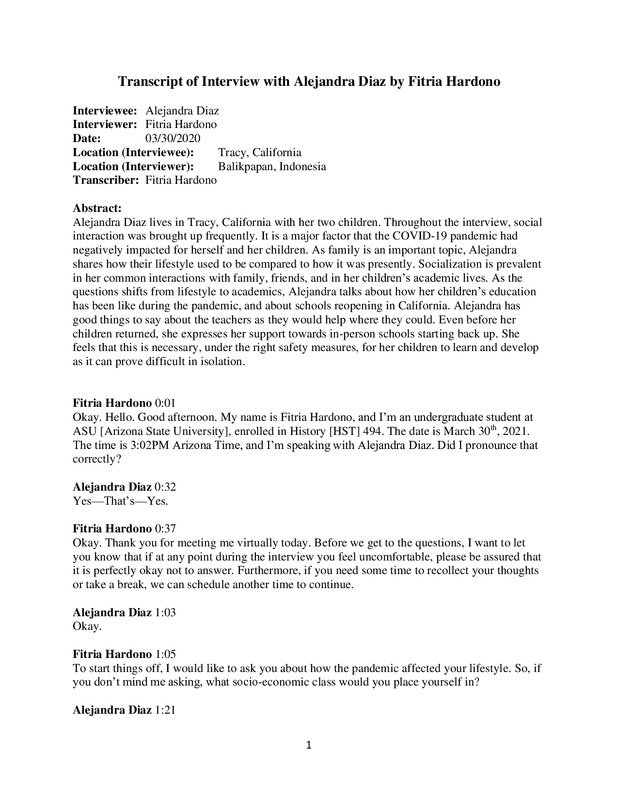
03/30/2021
Alejandra Diaz lives in Tracy, California with her two children. Throughout the interview, social interaction was brought up frequently. It is a major factor that the COVID-19 pandemic had negatively impacted for herself and her children. As family is an important topic, Alejandra shares how their lifestyle used to be compared to how it was presently. Socialization is prevalent in her common interactions with family, friends, and in her children’s academic lives. As the questions shifts from lifestyle to academics, Alejandra talks about how her children’s education has been like during the pandemic, and about schools reopening in California. Alejandra has good things to say about the teachers as they would help where they could. Even before her children returned, she expresses her support towards in-person schools starting back up. She feels that this is necessary, under the right safety measures, for her children to learn and develop as it can prove difficult in isolation.
-
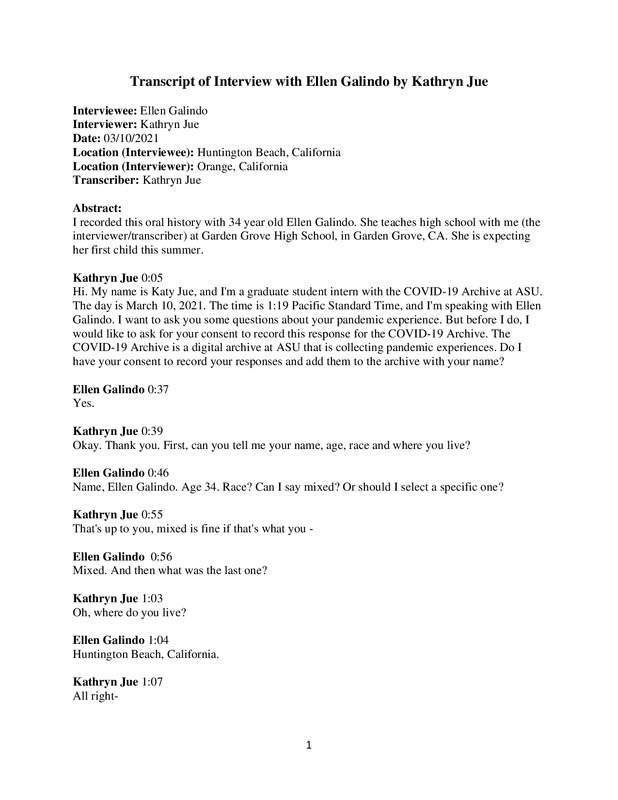
03/10/2021
This is an oral history of Ellen Galindo, a teacher in Orange County, California. The date of this interview was three days shy of the one year anniversary of when her school shut down. She has been teaching online for a year now. She is also expecting her first child. Her oral history is focused on her experience teaching through Distance Learning and her feelings on being pregnant during the pandemic.
-
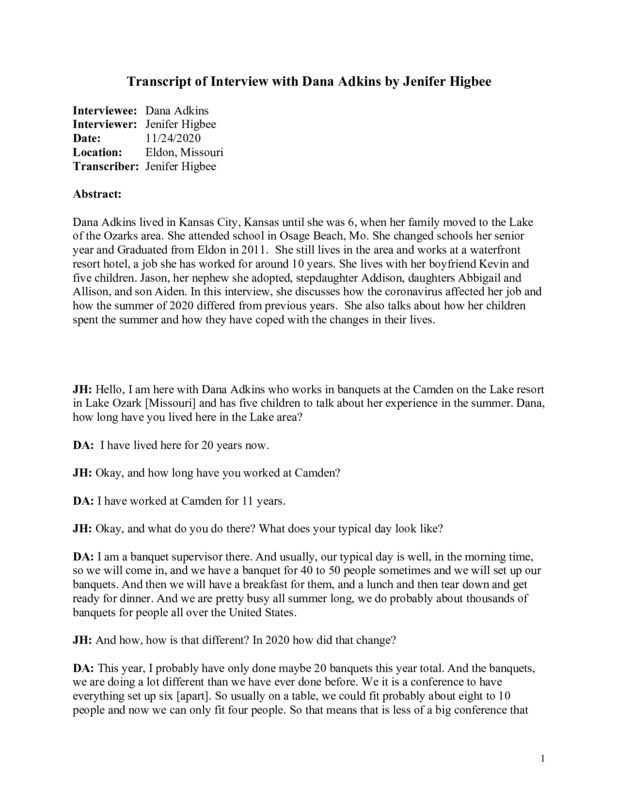
2020-11-24
Dana Adkins is a Mother that works at a summertime resort. She discusses how the pandemic impacted her job. Also discussed is how her children handled the changes to their routines.
-
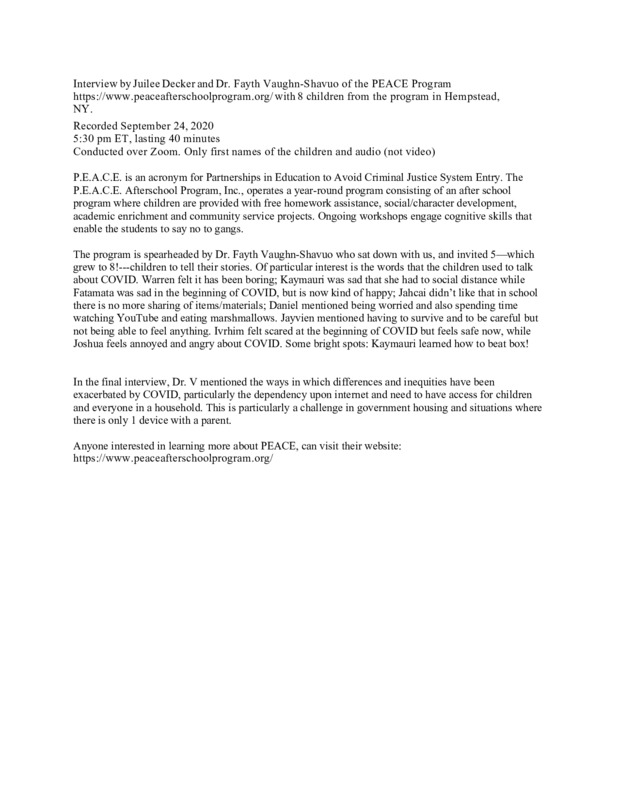
2020-09-24
P.E.A.C.E. is an acronym for Partnerships in Education to Avoid Criminal Justice System Entry. The P.E.A.C.E. Afterschool Program, Inc., operates a year-round program consisting of an after school program where children are provided with free homework assistance, social/character development, academic enrichment and community service projects. Ongoing workshops engage cognitive skills that enable the students to say no to gangs.
The program is spearheaded by Dr. Fayth Vaughn-Shavuo who sat down with us, and invited 5—which grew to 8!---children to tell their stories. Of particular interest is the words that the children used to talk about COVID. Warren felt it has been boring; Kaymauri was sad that she had to social distance while Fatamata was sad in the beginning of COVID, but is now kind of happy; Jahcai didn’t like that in school there is no more sharing of items/materials; Daniel mentioned being worried and also spending time watching YouTube and eating marshmallows. Jayvien mentioned having to survive and to be careful but not being able to feel anything. Ivrhim felt scared at the beginning of COVID but feels safe now, while Joshua feels annoyed and angry about COVID. Some bright spots: Kaymauri learned how to beat box!
In the final interview, Dr. V mentioned the ways in which differences and inequities have been exacerbated by COVID, particularly the dependency upon internet and need to have access for children and everyone in a household. This is particularly a challenge in government housing and situations where there is only 1 device with a parent.
Anyone interested in learning more about PEACE, can visit their website: https://www.peaceafterschoolprogram.org/
-
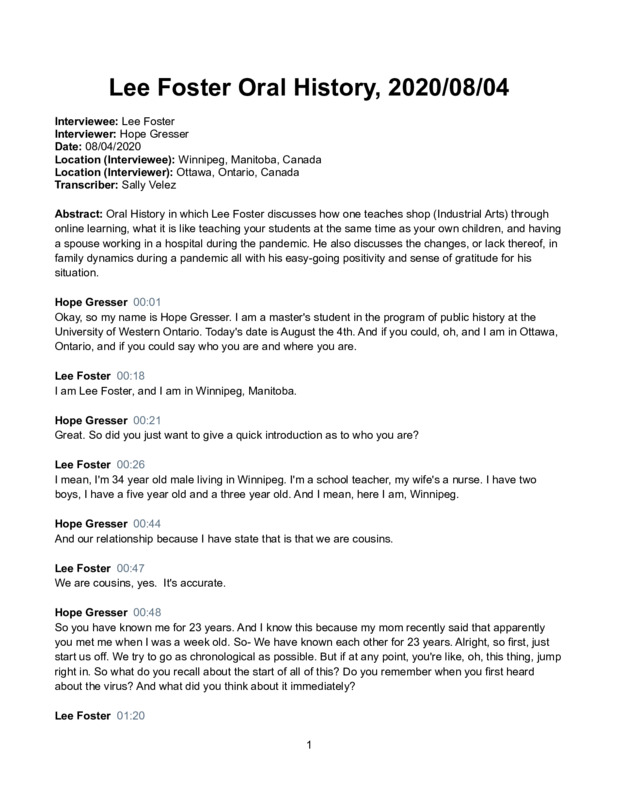
08/04/2020
Oral History in which Lee Foster discusses how one teaches shop (Industrial Arts) through online learning, what it is like teaching your students at the same time as your own children, and having a spouse working in a hospital during the pandemic. He also discusses the changes, or lack thereof, in family dynamics during a pandemic all with his easy-going positivity and sense of gratitude for his situation.
-
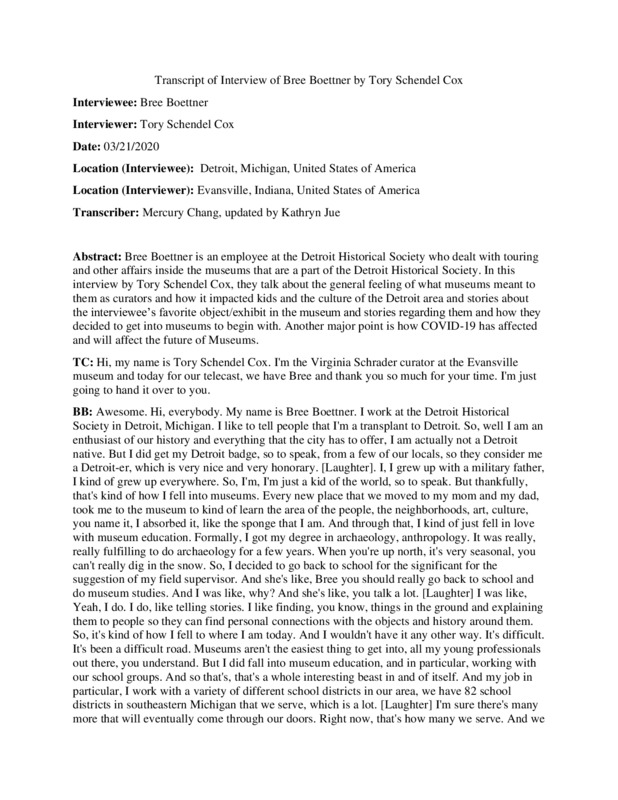
03/31/2020
In response to COVID-19, the Evansville Museum of Arts, History and Science launched the mini-series, "Cultural Insights: Interviews in the Creative Sector," to highlight colleagues and professionals working in the same or similar field of museum professionals.
-
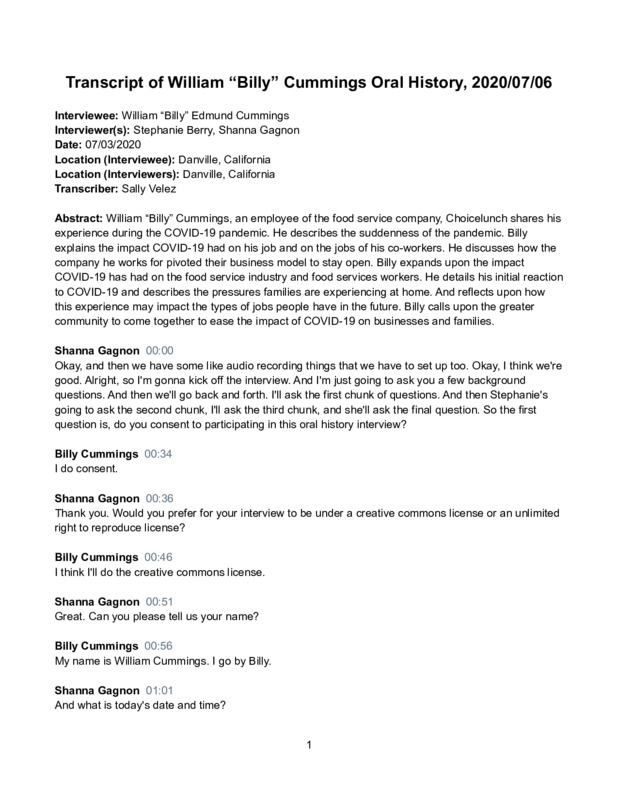
07/06/2020
William “Billy” Cummings, an employee of the food service company, Choicelunch shares his experience during the COVID-19 pandemic. He describes the suddenness of the pandemic. Billy explains the impact COVID-19 had on his job and on the jobs of his co-workers. He discusses how the company he works for pivoted their business model to stay open. Billy expands upon the impact COVID-19 has had on the food service industry and food services workers. He details his initial reaction to COVID-19 and describes the pressures families are experiencing at home. And reflects upon how this experience may impact the types of jobs people have in the future. Billy calls upon the greater community to come together to ease the impact of COVID-19 on businesses and families.
-
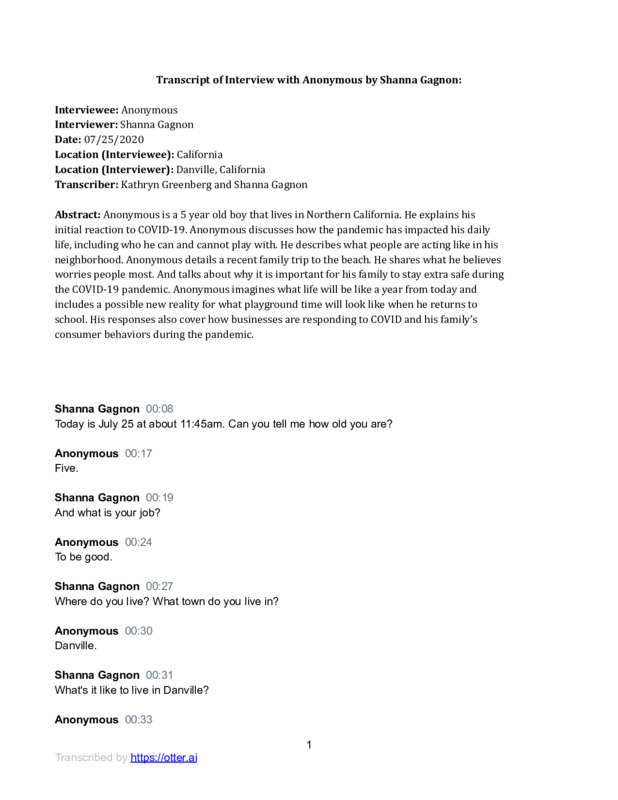
07/25/2020
Shanna Gagnon conducts an interview with Anonymous. Anonymous is a 5 year old boy that lives in Northern California. He explains his initial reaction to COVID-19. Anonymous discusses how the pandemic has impacted his daily life, including who he can and cannot play with. He describes what people are acting like in his neighborhood. Anonymous details a recent family trip to the beach. He shares what he believes worries people most. And talks about why it is important for his family to stay extra safe during the COVID-19 pandemic. Anonymous imagines what life will be like a year from today and includes a possible new reality for what playground time will look like when he returns to school. His responses also cover how businesses are responding to COVID and his family’s consumer behaviors during the pandemic.
-
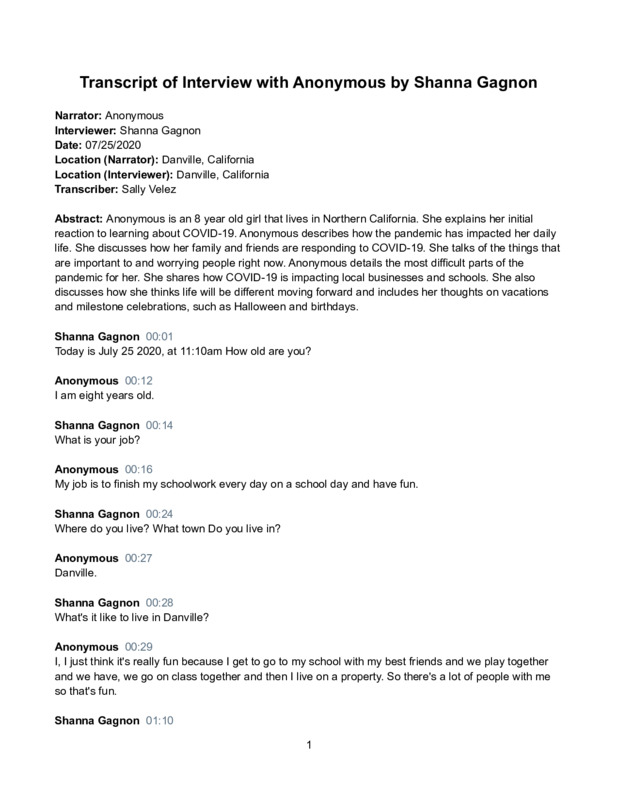
07/25/2020
Shanna Gagnon interviews an anonymous 8 year old girl about the COVID-19 pandemic. She explains her initial reaction to learning about COVID-19. Anonymous describes how the pandemic has impacted her daily life. She discusses how her family and friends are responding to COVID-19. She talks of the things that are important to and worrying people right now. Anonymous details the most difficult parts of the pandemic for her. She shares how COVID-19 is impacting local businesses and schools. She also discusses how she thinks life will be different moving forward and includes her thoughts on vacations and milestone celebrations, such as Halloween and birthdays.
-
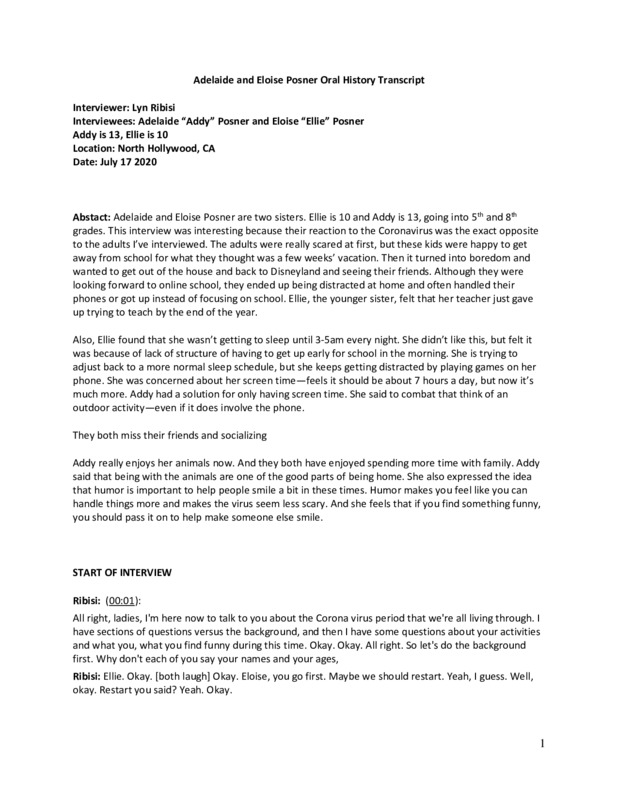
07/17/2020
This is an interview with two sisters, Adelaide, 13, and Eloise, 10. They discuss their lives since COVID-19 hit as well as humor and its role in facing hard times.
-

2020-07-10
This is an oral history interview by AG, a 39 year old mother of three young children living in the San Francisco Bay Area. She discusses the stresses and worries about the Coronavirus time.
-
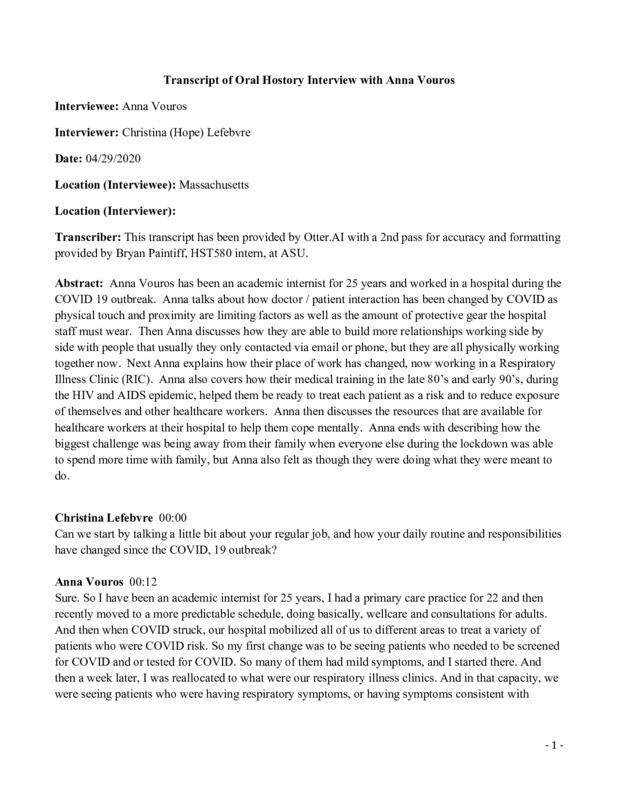
04/29/2020
Christina Lefebrve conducts an Oral History with Dr. Anna Vouros, a doctor as Massachusetts General.
-
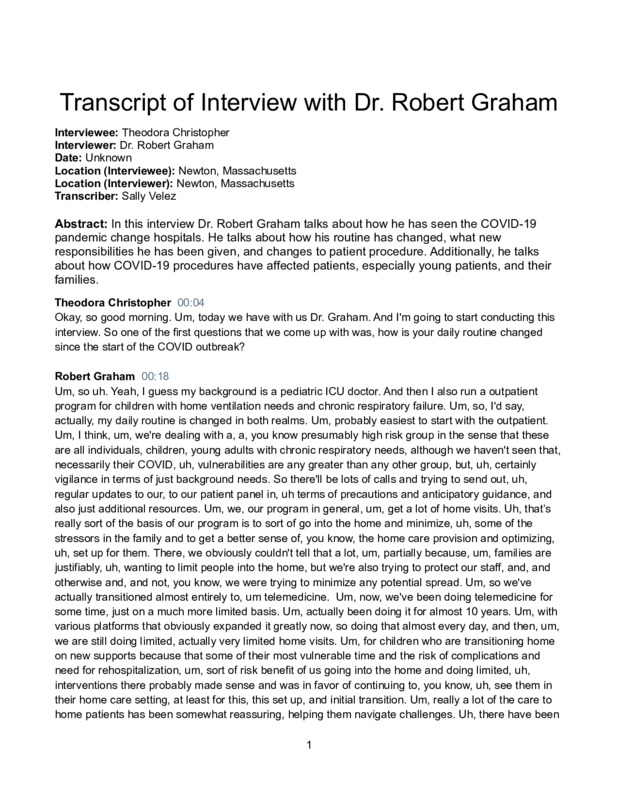
4/22/2020
Theodora Christopher interviews Robert Graham whose background is in pediatric ICU respiratory treatment. He discusses COVID-19 and its effect on children and adults and the difference in number of cases in different locations. He also discusses the effect COVID has had on facilitating clinical trial, etc.
-
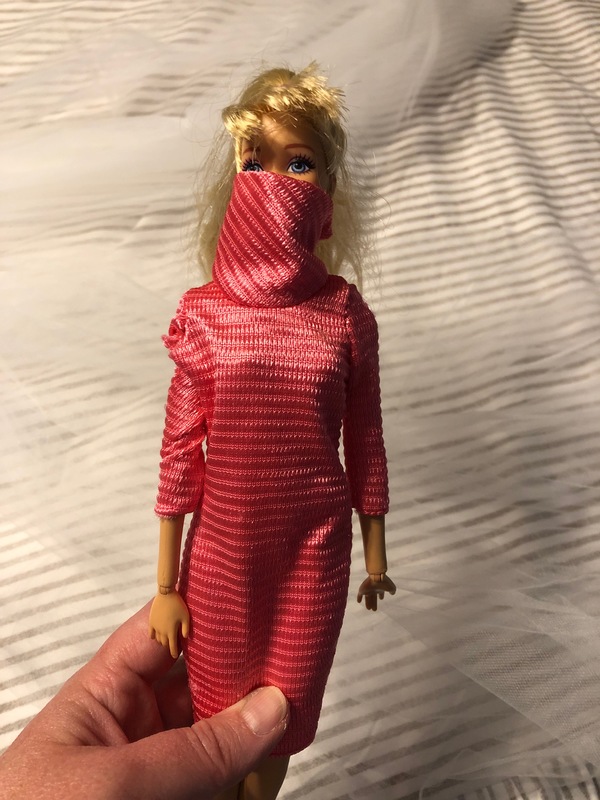
2020-05-29
This is an interview from May 29th 2020 with five-year-old Emily of rural Oklahoma about COVID-19. She talks about her doll she named "Corona Barbie" in which she used a high neck dress to cover the doll's mouth like a mask. Emily also talks about missing family vacations, missing school, and especially missing her teacher Mrs. Looper. Growing up in a rural area, she was most excited to be able to share videos of her chickens hatching via Facebook Messenger Kids during the pandemic. Photograph included that inspired the interview is of the actual "Corona Barbie" mentioned in the interview. The photograph was taken on March 16th, 2020. Submitted for the #ruralvoices collection. Contributed by Clinton P. Roberts, curatorial intern for Arizona State University, HST 580. #HST580 #ASU
 2020-05-26
2020-05-26 2021-10-02
2021-10-02 2021-10-05
2021-10-05 2021-07-15
2021-07-15 07/08/2021
07/08/2021 2021-05-02
2021-05-02 03/30/2021
03/30/2021 03/30/2021
03/30/2021 03/10/2021
03/10/2021 2020-11-24
2020-11-24 2020-09-24
2020-09-24 08/04/2020
08/04/2020 03/31/2020
03/31/2020 07/06/2020
07/06/2020 07/25/2020
07/25/2020 07/25/2020
07/25/2020 07/17/2020
07/17/2020 2020-07-10
2020-07-10 04/29/2020
04/29/2020 4/22/2020
4/22/2020 2020-05-29
2020-05-29